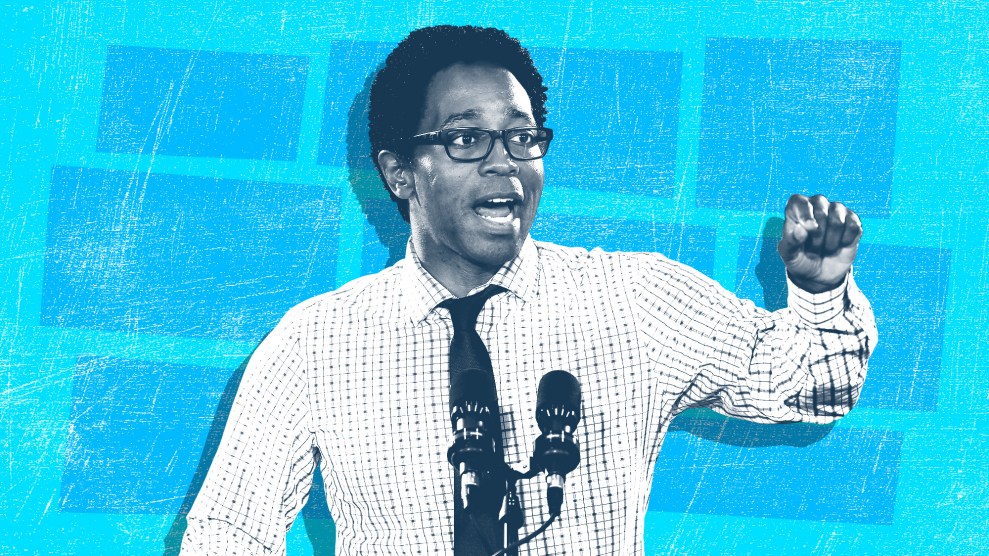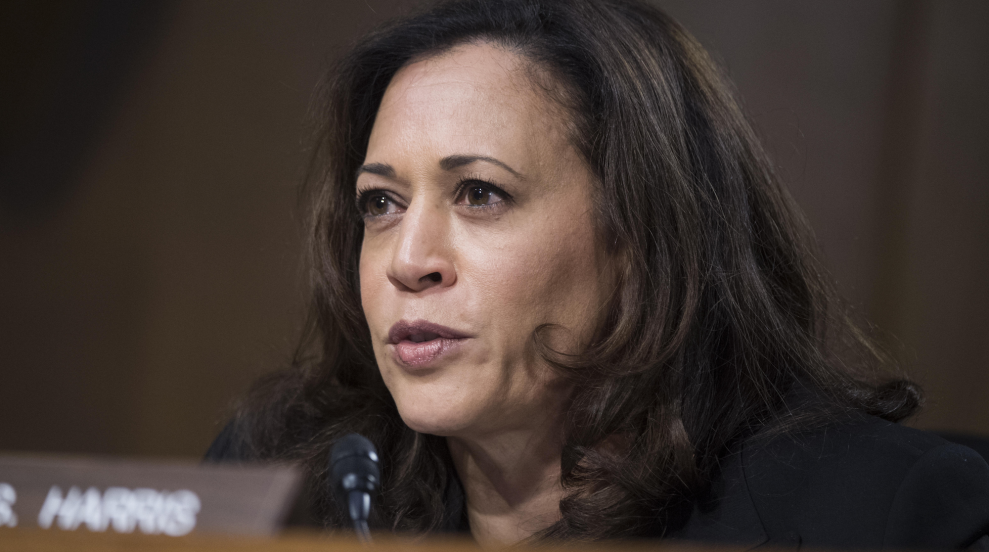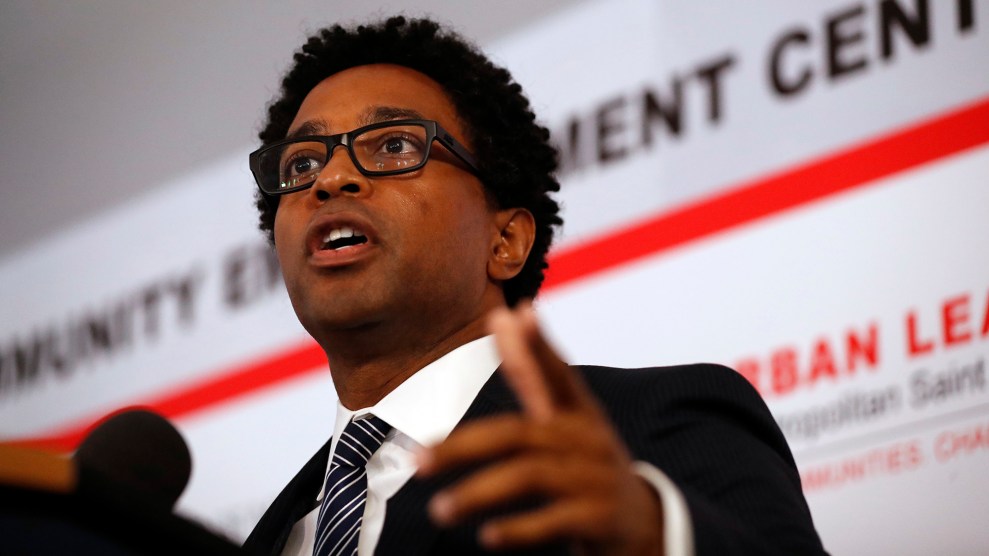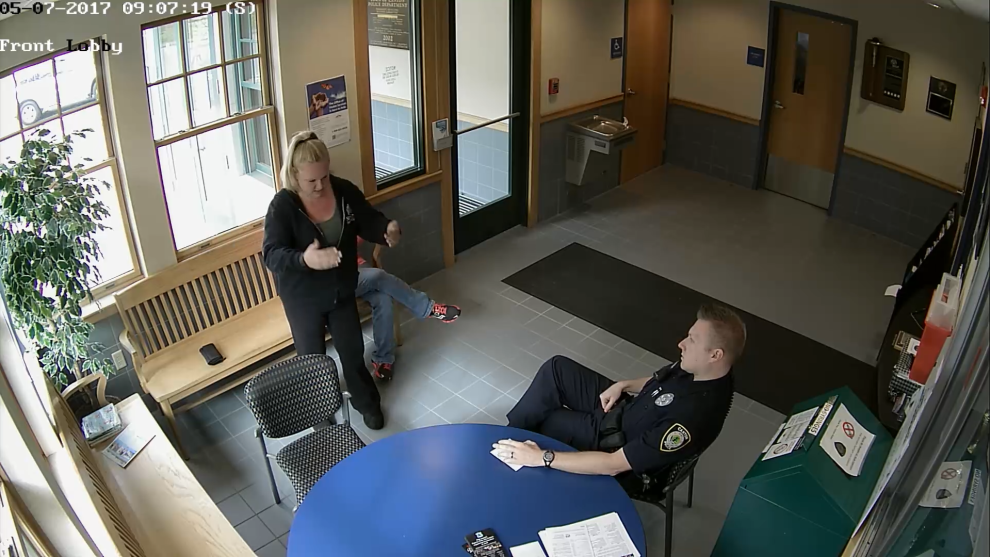
Credit: Mother Jones; Jeff Roberson/AP
On the night Wesley Bell unseated longtime St. Louis County prosecutor Bob McCulloch, Kayla Reed celebrated a progressive electoral victory and a personal promise fulfilled. Reed has been protesting and organizing in the St. Louis area ever since Darren Wilson, a white cop, shot Michael Brown, a black 18-year-old, in 2014. She remembers the night when McCulloch announced that, after the presentation of evidence, the grand jury had ultimately chosen not to charge Wilson for Brown’s death. She cried. And then she decided, “Bob McCulloch must be removed from office, no matter the sacrifice or effort it would take.”
Over the next four years, she worked to make good on that vow. She co-founded Action St. Louis, a black-led activist collective dedicated to political organizing, which helped elect Circuit Attorney Kim Gardner in neighboring St. Louis city in 2016. Two years later, they created viral hashtags and organized fundraising events to help push what is normally a low-turnout local primary held in the dead of summer into a nationally watched race. Gardner’s election was a major victory. But this was different.
“We celebrated both. But there was more satisfaction from this win because we got to unseat Bob McCulloch,” she remembered. “It felt more personal.”
However, Reed’s joy was not shared by everyone. Several prosecutors—the very people Bell was expected to lead—were less than excited by the prospect of a new era. It felt personal to them, too. “County voters will soon regret what they did,” an aggrieved assistant county prosecutor of more than 30 years posted on Facebook after the election, giving voice to broader unrest among longtime colleagues of McCulloch. (He was soon fired by Bell.)
During the campaign, McCulloch held firm to his tough-on-crime approach, saying that in his nearly 30 years as a prosecutor, he “removed the most dangerous and violent criminals from our neighborhoods.” He proudly emphasized his police roots, often recalling his experience as the son of a cop. McCulloch famously never charged an officer in a shooting, and to questions about the Ferguson protests, McCulloch simply answered that he followed procedure.
Bell made a striking foil in the race. Though he was also the son of a police officer, Bell, a 44-year-old black man, branded himself as a “leader in the streets,” and someone who was unafraid to speak out against racial inequality. He highlighted his experience working with the Department of Justice—he helped implement recommendations from its report denouncing Ferguson’s racist policing efforts that profited off largely low-income communities of color by overwhelming them with fees for petty misdemeanors like traffic violations. Bell heavily criticized the decision not to prosecute Wilson, using it as an example of why police and prosecutors should remain “separate and independent.” His campaign broadcast a series of ambitious reforms: a pledge to prioritize serious crime over petty misdemeanors, an end to the death penalty, and a requirement for police oversight.
To his supporters, Bell’s proposals are a model for criminal justice reform, joining those of prosecutors like Larry Krasner in Philadelphia, Rachael Rollins in Suffolk County, Massachusetts, and Mark Gonzalez in Nueces County, Texas, who have helped popularize the term “progressive prosecutor.” The classification, while vague, carries enough weight now that there is debate about who qualifies for the term. Notably, since California Sen. Kamala Harris announced her campaign for president, the debate has reached mainstream national attention. She’s proudly dubbed herself a progressive prosecutor, referring to her roles as former San Francisco district attorney and then California attorney general, but critics are quick to point to her record of prosecuting sex workers and targeting people for truancy as evidence to the contrary.
Bell has a particularly fine line to walk in his new position. As a prosecutor in a birthplace of the Black Lives Matter movement, he’s balancing significant pressure from the activists who helped elect him while he works within the system that inspired their anger in the first place. Bell says he wears his label of progressive prosecutor “as a badge of honor,” but he also admits that it can weigh him down. “That’s where the conversation gets muddled and the tendency is to pick a side,” he tells Mother Jones.
According to David Alan Sklansky, a Stanford law professor focusing on criminal procedure, Bell will continue to feel the burden that comes with such an ill-defined label as he gets further into his tenure. “The record of any prosecutor is going to be mixed,” Sklansky says. “And because there’s some ambiguity about what parts of being a progressive prosecutor are most important, there’s going to be some ambiguity about whether somebody who’s been in office and has done some things progressive…and not made progress on some other [progressive] issues, should be given more years.”
For his part, Bell says he isn’t so concerned about labels—he only cares about implementing policy that works.
Bell has been ruminating on concrete policy solutions for a racist criminal justice system for a long time; he is optimistic about the potential for change, yet realistic about the immeasurable challenges before him. “You are never truly free if your brother is in chains,” he said in a recent banquet speech at the University of Missouri School of Law, calling the criminal justice system one of the “greatest ills of our society.” He ended his address on a hopeful note: “It is possible to change the laws of the land.”
His aspirations for a better future paired with his matter-of-fact way of speaking about inequality is in part what earned Bell a devoted political following after the Ferguson protests in 2014. The following year, he ran for City Council in the third ward, mixing policy rhetoric with clear proposals. “What I’ve been screaming from the hills for years is…community-oriented policing,” he told an interviewer during that race.
After Bell won in a landslide with nearly 70 percent of the vote, he helped set up the North County Police Cooperative in that image. The initiative was both a progressive and logistical fix—it emphasized community partnership and consolidated multiple local police departments across St. Louis County into a single unit. The new police force calls itself a “positive alternative to the status quo” and says citizens should expect cops to coach sports teams, shake hands, and set up movie nights in addition to their patrol work.
As a politician, Bell was praised for seeing the Ferguson protests for what they were—a major opportunity for reform and a turning point in a long tradition of racism and police brutality. “These events will be in our kids’ history books,” he said. “We have an opportunity here to effectuate sustainable change and progress. We have the eyes of the world watching.”
After three years as a Ferguson city councilman, Bell decided to run for prosecutor. “There’s a real need for criminal justice reform in not only St. Louis County, but around the country,” he told the New York Times shortly after he announced plans to run. “For years, prosecutor/D.A. races have just kind of run under the radar. But now people are much more aware of the impact of this office, and that’s a good thing.” Bell criticized McCulloch in the local press for his reluctance to stick his neck out to change policing after Ferguson. “It would have been nice to have some support from that office,” he said. “You’re talking about one of the most tenured elected officials in our state not having any footprint on much-needed reforms in the area that he’s representing.” He also condemned McCulloch’s decision to handle the Michael Brown case personally, saying that he should have recused himself. “It was completely inappropriate for him to handle that case.”
But by the time Bell was elected in November, he had already seen up close how a progressive prosecutor’s honeymoon could quickly sour. Kim Gardner was elected the city of St. Louis’ circuit attorney in 2016—the first African-American to hold that office. (The city of St. Louis, where Gardner was elected, is separate from St. Louis County, where Bell is positioned and where Ferguson is located.) She too was elected on a reform agenda two years after Brown’s death. “Kim was just slightly before the hype,” Reed says. “[She] was really one of the first elected under this idea of a progressive prosecutor.”
Indeed, Gardner drew the support of activists like Reed and members of Action St. Louis, who endorsed her campaign after holding forums for the candidates. The tone of Bell’s campaign was quite similar to that of Gardner’s. Both were vocal about issues of racism and police misconduct. “I’m a people’s champ,” Gardner told reporters after winning the Democratic primary on a platform of ending mass incarceration.
She took office quietly in January 2017. To the hopeful activists who had helped elect her, it was unclear if she was head-down working toward reform or she simply wasn’t doing anything at all. She said she’d been working mostly behind the scenes on low-level felony negotiations. But months later, the Riverfront Times published a report that quoted frustrated prosecutors who said they had waited around for Gardner to introduce her agenda of reform after she took office.
“When Kim is referred to as a progressive prosecutor it makes me cringe,” a prosecutor told the paper. “Her approach has been, when in doubt, lock them up.”
Gardner often puts the difficulty of her position in the context of the “post-Ferguson” era—in an interview with the Riverfront Times, she invoked the qualifier multiple times. She has been scrutinized for her insistence on taking a carjacking case to trial in which both the FBI and the prosecutor on the case expressed doubts about the defendant’s guilt. The defendant was acquitted in the end, but not before he spent six months in jail awaiting trial. And then there was the case involving police officer Jason Stockley, who was charged with murdering Anthony Lamar Smith, a 24-year-old African American man, after a 2011 car chase. The case was a holdover from the previous administration, but it was tried under Gardner’s oversight. Stockley was found not guilty of murder, and protests erupted as a result.
Jeff Roorda, head of the St. Louis Police Officers Association, and his union clashed first with Gardner. Last August, the Post-Dispatch broke a story that Gardner had a list of 28 officers on the police force she refused to take cases from, citing past misconduct. Roorda hit back by telling the Riverfront Times that Gardner “completely ruined” the relationship between the cops and the prosecutor’s office, and at Christmastime, he included an image of Gardner photoshopped to look like the Grinch in the union newsletter, alongside insults in rhyme. At a panel in January, Bell and Gardner both went on record with their grievances against the union. Gardner called it “one of the most aggressive unions in the country.”
Bell hopes to avoid some of these pitfalls by keeping the channels of communications open with new prosecutors and the public. “There are some core beliefs that I won’t budge on, but the implementation of those beliefs, those reforms—we want the institutional knowledge, we want input,” he said. “I don’t think it’s a matter of people being diametrically opposed.”
Even so, the tensions between Bell and law enforcement began to escalate before Bell was sworn in. In December, two weeks before he was set to officially take office, the St. Louis County prosecutorial staff joined the St. Louis Police Officers Association, Roorda’s police union in neighboring St. Louis city. It was a bold, unprecedented move: Joining the police officers’ union meant a potential conflict of interest if a county prosecutor needed to look into a city officer. Bell, for his part, insists that any situation in which prosecutors are allied with police is an inherent conflict of interest, given the nature of their jobs, which was a key area of outrage after Brown was killed. The discretion given to a prosecutor is compromised if they’re obviously pro-police. And perhaps more importantly, it signaled that prosecutors in Bell’s office were not open to the change he promised. The Washington Post called it “a direct attack” on Bell and his promised reforms.
In theory, if there were a situation in which a prosecutor from the county needed to look into a police officer from the city, the job could be kicked to the attorney general’s office. But the conflict of interest concerns go beyond that, says Kate Levine, a professor at St. John’s University who has written about the relationship of prosecutors and police. “Prosecutors exercise so much power in the criminal justice system,” she says, “they have total discretion about when and whether to bring charges.” The alliance aimed to send a message to Bell—that his ideas about reform and social justice were not welcome—but it also further violated the trust of a community that was still reeling from Brown’s death and the decision not to prosecute Wilson.
“When St. Louis [County] folks don’t prosecute a police officer—they may have a good reason for not doing it—but [now] it’s even uglier,” she told Mother Jones. “Their appearance of impartiality is pretty much all they have to recommend to the people who they allegedly represent that they have their interests in mind.”
The controversial alliance reminds Reed of the way officers wore bracelets supporting Darren Wilson after Michael Brown’s death. “They felt attacked by people asking for something different,” she said. “While 100,000 people voted for change, a few people can stop or can try to challenge that.”
At the very least, the timing was “odd,” wrote local columnist Tony Messenger. There was no reason to rush unionization right before Bell took office. It could have been because of a desire to move swiftly, mused Messenger, “or maybe it’s just Bell, who promises change.”
Union leaders maintain that this isn’t unusual or a conflict of interest, because the county and city are independent of each other. Roorda says that claims that his union is trying to curtail Bell’s reform efforts are “complete nonsense.” Any frustration over unionization, he says, is “because [Bell’s] reforms are falling flat on their face and they’re lashing out looking for someone to blame.” (Roorda is also the author of Ferghanistan: The War on Police. He donated a portion of the proceeds from his book to Wilson.)
He also takes Bell’s criticisms of the unionization as a personal attack on his officers. “The policemen are not the system,” Roorda says. “And people get the two confused all the time. My cops, I think universally believe that it’s their job to deliver criminals to the doorstep of the prosecutor’s office. If the prosecutor doesn’t do their job, then that’s up to them.”
Bell insists that most prosecutors are on board with his reforms, and he’s consulting with his employees as he speedily moves through his list of campaign promises. His first day on the job, Bell instructed staff in an interim memo that cash bail for misdemeanors should be an exception rather than the rule, to not “overcharge” on felonies, and to share documents with defense counsel. (Similar pre-trial discovery rules are being championed as a major progressive victory in New York.) On his second day, he fired the prosecutor who presented evidence to the grand jury in the Michael Brown case, which resulted in Wilson’s freedom. Bell announced a couple of weeks later that his office won’t prosecute most low-level marijuana possession cases, and similarly that prosecutors will not pursue child support cases criminally, instead opting to handle such disputes in civil court. In a high-profile case involving charges of sexual assault and murder, he refused to seek the death penalty.
All of these edicts were met with union pushback, but the group was particularly incensed over the change to child support cases. A union lobbyist tweeted that supporters of the policy are “dead beat parents.” Soon after, there was legislative pushback: Jim Murphy, a Republican state representative, introduced a bill in January to empower the state attorney general to prosecute cases that the district attorney passes on.
“There’s really a break in this two or three-decade-long law-and-order position,” Reed said. The speed of Bell’s efforts has pushed prosecutors and police to fundamentally change how they see themselves within the system and unlearn long-established processes. Reed thinks Bell has done a good job clearly communicating with the public while moving internally on reforms. She’s happy with his progress so far, and she hopes Bell continues to ramp up the fight against mass incarceration, a key issue for Action St. Louis, which is currently working to reform conditions at the St. Louis city jail. Still, such a quick succession of changes, Sklansky says, can cause anxiety because “there are entrenched parts of the criminal justice system that are used to doing things the way that they’ve done them.”
Take the reform that Bell outlined in his day-one policies to give more evidence to the defense before trial. Line-level prosecutors, the same who unionized, will be the ones to do that. Police will have to produce that evidence. “A lot of discretion and prosecution work is necessarily diffused,” says Sklansky. People will have to relearn their own jobs. Ray Hartmann, the founder of the Riverfront Times, put it like this: “If Bell is a reformer, Roorda and his ilk are the reformees.”
Miriam Krinsky, executive director of Fair and Just Prosecution, which brings together reform-minded prosecutors across the country, said those kinds of growing pains are necessary. “There has yet to be a full recognition within [some] offices that the criminal justice system has tried to do too much—that it fills the space that, instead, public health or mental health or social services should be filling,” she said. “I think there is a need for a reset button in many of the offices to be hit.”
But that doesn’t mean it won’t cause agitation.
“A prosecutor’s job is to enforce the laws. The courts interpret them. And we [the Legislature] make them. If he wants to change the law, he ran for the wrong office,” Murphy told Mother Jones. “He can have a case-by-case discretion, but certainly not discretion to just become the king.”
Bell remains unfazed.
“We’re still going to implement the reforms and policies that St. Louis County voters overwhelmingly voted for,” he said.
And above all, for all the confusion about how to define who is and isn’t a truly “progressive prosecutor,” Bell says he’s looking for policies “that actually work—that’s the litmus test.”
“It is on to prosecutors like myself, who are considered progressive, to push,” he said. “But also, I hope other prosecutors who may not fall under that line of thinking out there start to do their homework and do their research. Because these policies work.”















